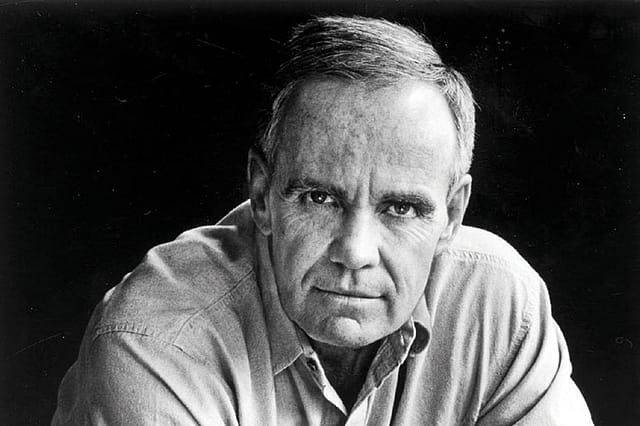Cormac McCarthy (1933-2023): A Poet of Violence

"He has never taught or written journalism, given readings, blurbed a book, granted an interview. None of his novels have sold more than 5,000 copies in hardcover. For most of his career, he did not even have an agent,"—so wrote the New York Times in 1992 in what would be one of the very infrequent interviews Cormac McCarthy gave. His first novel, The Orchard Keeper, came out in 1965 and it would take 17 years before Blood Meridian, the fifth one, made the literary world sit up. Still more decades would pass for the books to become bestsellers and then movies that won Academy Awards would be made on them, until by 2023, when he passed away this week at the ripe old age of 89, he was unarguably one of the greatest writers of the era.
It was writing on his own terms, raw, vivid, poetic and sudden violence. He became more accessible later on with novels like No Country for Old Men and the post-apocalyptic The Road but there was always a bleak overhang. McCarthy was a writer of man things, in the mould of Hemingway, with gritty damaged landscapes and people, often evil, living to a code. But even if you became overwhelmed with his density, you couldn't help but marvel at how intricately he weaved his world. Like this line from Blood Meridian: "The crumpled butcherpaper mountains lay in sharp shadowfold under the long blue dusk and in the middle distance the glazed bed of a dry lake lay shimmering like the mare imbrium and herds of deer were moving north in the last of the twilight, harried over the plain by wolves who were themselves the color of the desert floor." His words jumped and yet seemed effortless. It was writing that no one could learn—you were either born with it or not.
Openomics 2026: Continuity and Conviction
06 Feb 2026 - Vol 04 | Issue 57
The performance state at its peak
That was how he approached the craft, as something near automatic. In yet another rare interview, two students sent him an email questionnaire last year. Asked about his process his reply was: "Writing is very subconscious and the last thing I want to do is think about it." He wrote with only one reader in mind—himself, and as for punctuations, they were a needless irritant: "In an older time, writers filled pages with quotation marks, commas, semi colons, etc. supposedly to help the reader. But there comes a point where, in my opinion, they just mess up the page. I use as few diacritical marks as I can get by with."
Underpinning all of this was an unwavering daily writing routine starting before dawn and up to noon. He remained distant from literary circles but wasn't a social recluse. To The Paris Review he said that he had guests over most nights for barbecue, which he described as only he could: "I like to soak the mesquite chips for at least half an hour. Then there's the marinade for the brisket, or the dry rub, the laying on of hands. A replication of primeval violence. In your fingertips the harm of generations, the wish to make right, the failure to cleanse and absturge. Raw matter. Chile ancho, dried chipotles, paprika and salt, pulverized plant and rock, the sad spice and crumble of the earth's red crust. I put the beef in a plastic bag for two hours before my guests come."
After he wrote The Road in 2006, McCarthy didn't publish anything as the years moved on and he was into his late 80s. And then came not one, but two novels last year, The Passenger and Stella Maris, one after the other, almost simultaneously. Critics weren't enthralled. One reviewer in the New York Times wrote: '"The Passenger" is far from McCarthy's finest work, but that's because he has had the nerve to push himself into new places, at the age of all-but-90.' He might have flagged but never stopped, like some of his characters.
